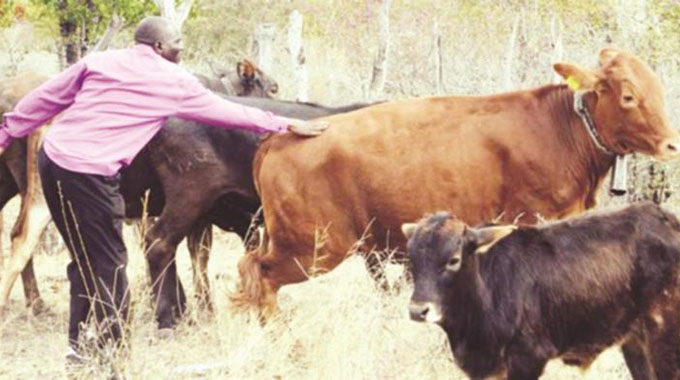Zim steps up tick-grease programme to reduce livestock deaths

Elita Chikwati
Agriculture Reporter
For years, smallholder farmers have lost cattle — a valuable asset — due to tick-borne diseases particularly January Disease (Theileriosis) leading to impoverishment and loss of wealth.
Tick borne diseases have continued to pose a serious threat to the national herd.
In Zimbabwe, livestock production is important as a source of livelihoods for 65 percent of the country’s rural households. The sector contributes significantly to inclusive growth of the agriculture sector and the economy as well as food and nutrition security.
It is sad that farmers collectively lost 300 000 cattle worth over US$150 million between 2017 and 2020 to tick-borne diseases particularly January Disease(Theileriosis).
Mashonaland East, Mashonaland West, Mashonaland Central and parts of Manicaland are the worst affected areas and most farmers in these areas who relied on draught power have to turn to conservation agriculture.
This is a continuation of the problem that began in 2017 when the national dipping programme started facing serious challenges.
There has been little or no aggressive campaign to promote the use of tick grease and other animal vaccination drugs to save their livestock.
And recent moves by the Government to launch the Presidential Blitz Tick Grease Programme as a disease control measure to curb the spread of tick-borne diseases particularly January disease is a step in the right direction.
The Tick Grease programme is in line with the National Development Strategy 1 which is prioritising animal health and production through strengthening farmer knowledge, skills in livestock production and health so as to enhance productivity through the following strategies.
The strategy stresses that livestock production plays an important role in the social, cultural and economic environment of Zimbabwe and offers a number of initiatives to boost production and productivity within the sector.
The tick grease programme being one of the National Development Strategy’s approach will save livestock while leaving the majority of the smallholder farmers empowered and with proper strategies for controlling animal diseases.
For the past years, smallholder farmers have been experiencing challenges in protecting their cattle from tick-borne diseases as they could not afford the chemicals while some communal dip tanks were no longer functional.
The coming in of this livestock programme is thus a welcome move just like most other smallholder farmers benefit from the Presidential Input Scheme as they will be getting free inputs in this case free tick grease.
Foreign currency shortages have compounded the problem against the tick-borne disease. Shortages meant the country had imported less cattle dip — known as acaricide.
In Zimbabwe, cattle are a common source of wealth and draught power, and the Government estimates that about 90 percent of the country’s nearly 5,5 million cattle are owned by small-scale farmers.
The support coming from the Government through this programme should compel most farmers to regularly dip their cattle to stop tick-borne diseases from spreading.
Farmers need to dip their cattle regularly as acaricides become available and refrain from moving their cattle illegally from one area to another.
Under the programme, small-scale livestock farmers will each be supplied with one kilogramme of tick grease to protect their cattle between dips, with dip tanks also scheduled for rehabilitation.
The programme will benefit one million households and cover 4 000 dip tanks.
One kilogramme of tick grease covers between six to eight months for a household with between 15 to 20 cattle.
The Department of Veterinary Services has already trained its staff to train farmers on the correct application of the tick grease on cattle on the tick feeding sites on the animal.
The tick feeding sites are the ears, base of the horn, under the tail, and tail brush.
Tick grease will not substitute dipping but will supplement intensive cattle dipping.
The programme will supplement intensive cattle dipping programmes in affected areas. Intensive dipping is when cattle dip three times in two weeks and tick grease will be applied in-between the dipping seasons.
Farmers should not stop dipping their cattle but continue with intensive dipping while at the same time applying tick grease in-between the dipping intervals.
Animal health experts advice farmers to intensify dipping to kill nymphs, popularly known as paper ticks before they grow into adults and continue to propagate and lay eggs.
Weekly dipping interrupts the breeding cycle of ticks and prevents a build-up of tick population in the veld. Dipping cattle in chemicals weekly helps to ward off the ticks.
At times smallholder farmers are to blame. Sometimes they do not recognise the importance of dipping the cattle.
Besides intensive and tick grease application, the Lands, Agriculture, Water and Rural Resettlement Ministry will also spearhead the local production of vaccines for tick-borne diseases to reduce the import bill.
The plan will ride on the European Funded Zimbabwe Agriculture Growth Programme to complete the renovation of the vaccine production unit at the Central Veterinary Laboratory for production of January Disease vaccine.
The Livestock Growth Plan will also see 2 637 dip tanks being rehabilitated and construction of 207 new dip tanks to decongest farmers at service delivery points and improve animal health and production.
This will use community labour with the Government providing financial and materials support. To ensure constant availability of water at the dip tanks, 920 boreholes will be drilled at dip tanks with water supply challenges.
With all these efforts, the livestock sector will be revamped and farmers and the country as a whole will start reaping huge returns from the sector.








Comments